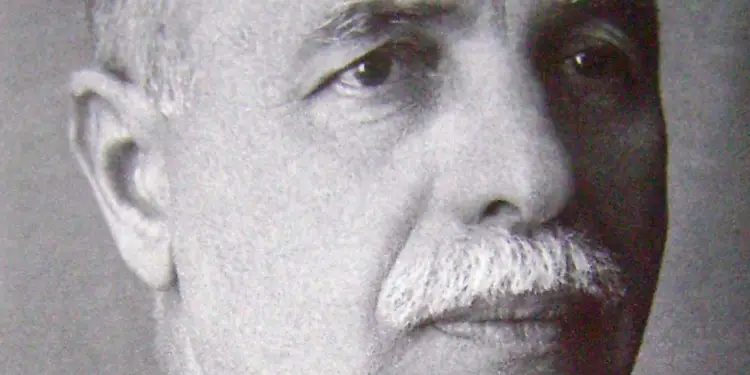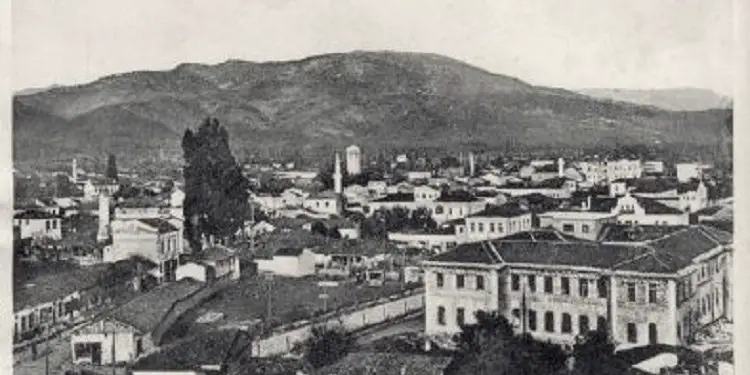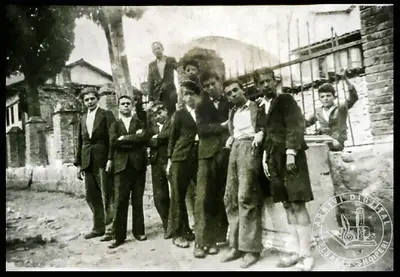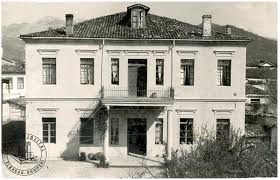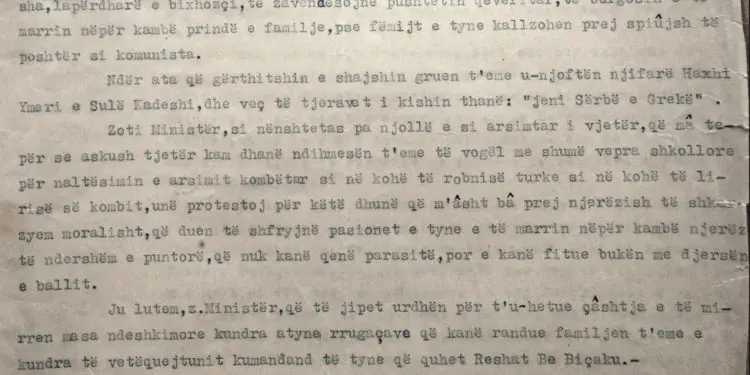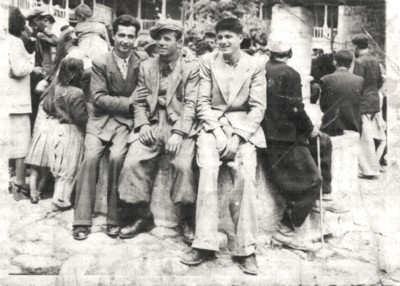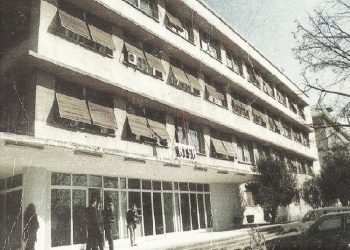From Veli Haklaj
– “Citizen Emine Kolimja (Gishti), a resident of the neighborhood ‘Hazinedare’, Elbasan, complained to the Prefecture that every night, the civil force went among the spies, disrespectfully and stealthily”-
Memorie.al / The object of this paper, which will be published for the reader, is the reflection of some aspects of the reality experienced in the Elbasan District, during the period of the German occupation. The focus of the paper will be the relations of the citizens with the civil and military authorities in this district, as well as the problems that appeared in the relations between the forces of the “National Front”, which operated in the District of Elbasan, and the structures of the central and local government. . Information of interest and military confrontations between the armed forces operating in this region will be reflected. In this paper, depending on the issues being addressed, there are data of interest for other counties bordering Elbasan County.
For the preparation of the paper, we have based mainly on documents that are administered in the fund of the Ministry of Internal Affairs, in the Central Archive of the Albanian State, with numerous authentic data on structures, organizations and persons, for their negative or positive implications. The illustrative maps are taken from the book Documents of the General Staff and the General Command of the Albanian National Liberation Army.
The powers of the National Front assume the attributes of government authority
On January 25, 1944, the District-Command of Elbasan reported to the General Command of the Gendarmerie on the interventions of the commander of the forces of the “National Front” in Librazhd, Isak Alla, in the controls of the cars passing to Korça, reducing the gendarmerie patrol. District-Command of Elbasan, emphasized that; “Isak Alla was well known as a looter and, as such, his power and himself in that city, they had a lot of looting of manufactured goods and various items, in addition to 2 thousand francs of the Society ‘Saide’ and so many others of a certain Mir Gjika , trader”.
As a result of these actions, desperate traders were forced to close their shops. Meanwhile, the Circle of Shijaku reported that the power of the “Balli Kombatar” there was doing; “inspections of your houses, pull and confiscate any material, without the knowledge and cooperation with the country’s gendarmerie”. Based on these events that were reported, the District-Command of Elbasan requested from the central authorities to inform them what the attitude of the gendarmerie would be in such cases. For the above events, on February 3, 1944, the Commander-in-Chief of the Gendarmerie, Colonel Hysni Dema, notified the Political Office of the Ministry of Internal Affairs. The most difficult situation in this regard was presented in the Peqin District.
On February 12, 1944, the General Command of the Gendarmerie, informed the Ministry of Internal Affairs, that a force of the “National Front” Organization, destined for Peqin, had clothed itself with all the attributes and powers that would be exercised by the government authority, as much as the gendarmerie there and other state bodies, were not at all able to exercise their duties and for this reason, they were offended and discredited in front of the people. In fact, the “National Front” Command, in Peqin, had taken over all public order, administrative and judicial services, functions that they had made known to the people, with public announcements on the walls. With such published announcements, the “National Front” Command in Peqin had left the people free to buy and sell monopolized items, which were estimated to cause great damage to the state coffers. Although the gendarmerie continued to circulate in public security services, they were by no means free to catch a culprit, because they would be immediately hindered by another power, the “National Front”, which “arrests suspicious persons without fault, beats, tortures, robs, appropriates money and other things and then they release them, so every guilty person has no way to pay for his crime before justice, but in one way or another remains free”.
At the end of this official communication, the General Commander of the Gendarmerie, Colonel Hysni Dema, prayed to the Ministry of Internal Affairs; “in order to provoke an intervention and an adjustment of this situation which is to the great detriment of the government’s prestige, possibly with the immediate departure of the leading people of the organization in question, who apparently serve only their own interests and ambitions, that as the high goal for which they should act”. But the situation in Peqin District continued to be problematic. On March 25, 1944, the sub-prefect of Peqin, Riza Ferri, informed the Prefecture of Elbasan and the Ministry of Internal Affairs, that the Provincial Committee of the “National Front” had transported significant amounts of food in different directions, which had continued for some time always tracking the most favorable markets, regardless of where it leads. The sub-prefecture of Peqin, in the absence of gendarmerie forces, had not been able to stop them and could not even stop them, because there was no checkpoint at all. According to sub-prefect Ferri, the Committee of Vlora was reminded too late (to request the quantity of nozzles for the population of Vlora), because the transportation of grain by the agents authorized by the Command of the “National Front” continued without stopping. Even in the information dated March 2, 1944, the District Command of the Gendarmerie of Elbasan, informed the Prefecture of Elbasan, about the obstruction that the volunteers of the Nationalist Command did to the Gendarmerie Arms.
Although the head of that Prefecture, in any case, had advised the volunteer commanders to give their help to the Gendarmerie, but the opposite had happened and continued to happen, so much so that the leading authorities of the Elbasan Gendarmerie had been constrained to order the gendarmerie to process and line up the civilians who had dared or would dare to interfere with the duties of the gendarmerie. In the information about the Prefecture of Elbasan, it was emphasized that; “This Civil Power does nothing here in the city for the benefit of the service and according to the information we have from the German Command, even as far as external military action is concerned, they have not shown themselves at the right level”! Based on the created situation, the District Command of the Gendarmerie of Elbasan, begged the prefect to order where necessary to speed up the dispatch of the Gendarmerie Armed Forces to Elbasan, “so as to put an end to the Bashibozuk shenanigans”. The Ministry of Internal Affairs and the General Command of the Gendarmerie were also informed about these developments.
Complaints of citizens for abusive actions
On March 28, 1944, various craftsmen from Elbasan addressed a prayer to the Ministry of Internal Affairs, where they complained about the non-liquidation of accounts by the “National Front”. Meanwhile, the robberies of the segments of the “National Front” continued in different forms. Fetah Kazadej and Arif Çerema, residents of Elbasan, informed the Ministry of Internal Affairs that three months ago they had started supplying the Command of the “National Front” of Elbasan with meat amounting to sixty thousand francs. At this time, the needs had been great and both citizens emphasized that they had been forced by the necessity of the circumstances, to complete the research done by the “Balli” Command. At the time of the order, as well as later, they were addressed to the Command of the “National Front”, but their right was not liquidated.
Based on the above, they considered it natural and right that these indisputable rights should be recognized and the money that represented items taken for the benefit of the state should be paid from the funds that would be deemed reasonable from the “National Front” Command. However, for the liquidation of their rights, the citizens of Kazadej and Çerema left it to the power of the Ministry of the Interior to determine the authority that would pay them. On April 4, 1944, citizen Emine Kolimja (Gishti), a resident of the neighborhood “Hazinedare”, Elbasan, addressed a letter to the Prefecture of Elbasan, where she submitted that; since the arrival of the armed civil force, not a night went by without the civil force going home, not only to the complainant’s house, but to every house in the “Hazinedare” neighborhood, hour after hour, even many times they had the chance to they woke up in the middle of the night. According to the complainant, “their goal in the house is only for dishonor and theft”. Since the behavior of the civilians who barely entered the house was disturbing the peace and intimidating the entire neighborhood, Emine Kolimja begged the authorities of the Prefecture to “kindly give the appropriate orders to the Command where they are hanging, to stop them those mentioned in the entrance of the houses they are making”.
A day later, the prefect of Elbasan, Lutfi Shehu, forwarded the letter of the citizen Emine Kolimja to the Political Office in the Ministry of Internal Affairs, emphasizing that “such disorderly behavior, theft, murder and forced entry into the house at night have become every day and are repeated by the power of Xhafer Bali”.
In the information of the Prefecture of Elbasan, it is emphasized that the armed civilians who engaged in such behavior were commanded by Xhafer Bali, who also appeared as the captain of the Gendarmerie. According to reliable information, Xh. Bali was not part of the “National Front”, but presented himself as such, having close contact with the various German commands of Elbasan and leaving “nothing uncreated against citizens and honest persons, for the purpose of personal fraud”.
Furthermore, Prefect Shehu writes that “this handsome man, this prefecture, with the power of the Gendarmerie, would show him the place he deserved, but the exaggerated support given to him by the German commander Langer, prevents us from any legal action, that we must take both against Xhafer Bali and against the armed civilian power dependent on him”. Based on the general interest in public order, Prefect Shehu asked the Ministry of the Interior, that Xhafer Bali no longer stay in Elbasan and urgently dispose of the necessary measures for his departure from this city, after the continuation of his stay in Elbasan, it was considered “in complete opposition to the interest of the country, and especially to the government’s prestige”.
But the abusive actions of Xhafer Bali’s followers continued even after that. On April 14, 1944, Muzafere Ypi, the wife of Bexhet Ypi, from Elbasan, addressed a letter to the Prefecture of Elbasan, where she complains against the adjutant of Xhafer Bali, why she asked him for the contribution that was assigned to her husband. In the letter of Ms. Ypi, it is emphasized that; one of the commanders of the “National Front”, Mr. Jorgji Mema had called her to appear in his private apartment, in a hotel in this city, to pay the contribution that was assigned to her husband, like many other residents of the city of Elbasan. Ms. Ypi had not objected to the contribution assigned to her husband, but she complained to the Prefecture of Elbasan that she, a woman, was called to pay the contribution, while her husband, who was present, had to be called by the “National Front” Committee “. Ms. Ypi begged the Prefecture, to demarche where necessary, to leave her alone in her house, “because in this case, the contributions are assigned to men and not women”. Within the day, Muzafere Ypi’s letter was forwarded by the Prefecture of Elbasan to the Ministry of Internal Affairs, where it was added that; “Such acts are related to the personal dealings of Mr. Jorgji Mema, who is an associate of Xhafer Bali”.
Complaints against the actions of the Youth of the National Front
On April 6, 1944, the prefect of Elbasan, Lutfi Shehu, informed the Ministry of the Interior about the formation of a Youth Command in Elbasan, under the authority of Shyqyri Biçaku (son of Dervish Bey Biçaku). According to this reserve information, “this command had gathered in its bosom young, degenerate persons who, despite their young age, had changed their opinion many times”. As their prototypes, Cen Graceni and Shefqet Ibrahimi were presented, dangerous communists, who had recently killed Koço Niko, by order of the Communist Party and who had previously been tract distributors. Also, Ali Abazi, a former quaestary agent in Berat, where he had abandoned his duty and for several months, had been part of a communist partisan detachment, as well as Qamil Arapi, formerly a communist and later a spy, were included in this command. Gestapo, and that for the robbery of money from the people, in the name of the German Command, it was requested by the gendarmerie structures of Elbasan, for proceeding.
For the mentioned persons who had previously been communists, the Prefecture of Elbasan had given the commander of this Youth and instructions to use them to show the communist element of the city and, if the commander was not able to take advantage of of them, had requested that those persons be handed over to the gendarmerie, which with its administrative measures would be able to discover from them, even persons of great interest to public order. In the information of the Prefecture of Elbasan, it was underlined that since the people who were part of the above-mentioned command, were more or less of the category mentioned above, there was no possibility, in any way, that service was expected from them serious and honest, and “especially when they acted in the name of the Nationalist Youth, so that every night definitions are made in apartments, innocent people are taken, kept in prison and then released”. It often happened that they “took twenty-year-old girls at night and, as they used to do with sleeping bags, they kept them until morning and then released them”.
For all these works they did, the Youth Command did not even accept a single advice from the local authority and no longer informed the authority. For all this, the Prefecture of Elbasan had also informed the German Command.
In the information it is noted that; the sons of Dervish Bey Bicak, had appeared on the scene at the behest of their father and acted exactly according to the instructions of Xhafer Bali, who was staying in Elbasan, in support of the German Command and to secure his material interests, at the expense of the people: “1) that he acts on behalf of the “Balli Kombëtar”, but the “Balli Kombëtar” does not recognize him; 2) that he acts in the name of nationalism and therefore allegedly in favor of the government, but the government does not even recognize him, he acts as his interest wants. As in the communication of the day before (April 5), prefect Shehu begged the Ministry of the Interior to do everything possible to remove Xhafer Bali from Elbasan, since his attitude and work were considered in complete opposition to government policy and the actions of the authorities of the Prefecture there, instead of presenting the government with dignity, became ridiculous for days and more, before the public opinion of Elbasan.
Actions considered illegal were carried out by the so-called “Balliste Youth” and against the wife and daughters of the respected teacher Aleksandër Xhuvani. Regarding the events that took place, he, avoiding the authorities of the local government, addressed on May 6, 1944, with a direct letter to the Minister of Internal Affairs, Xhafer Deva. Based on the importance of the information it conveys, but also in respect of Prof. Dr. We are giving his letter to Xhuvan in full below, preserving the language of the document.
Mr. Minister,
I am taking permission to report to my Lord, an event that happened in Elbasan in my family:
On the 26th of the last month, they broke into my house in Elbasan; some guys armed themselves and tried to take my two sisters, Iolanda and Semirani, to call them communists. These were sent by Reshat, the son of Dervish Bey, who assumed the title of Commander of the so-called “Ballistic Youth” of Elbasan. They didn’t find the girls there, but they threatened my wife with shame and yelling, to hand over the girls that their commander loved, because otherwise, they could shoot her too. Three months ago, Xhafë Bali and other armed men came to my house in Elbasan at night and took my wife and daughter and imprisoned them and released them after two days. Now the people of the so-called “Rini balliste” are coming again, private people, without any official status, they are rude and they take the woman’s face, dance and dance.
Mr. Minister, all citizens are obliged to obey the laws, to obey the orders of the Government, to be judged fairly by it, if they are guilty, and to participate in its work of replacing and rebuilding the State. But it is a great violence against the prestige of the governmental power, that some young women, idlers and gamblers, replace the governmental power, imprison and take away parents and families, because their children are accused of vile spies, as communists. Among those who snorted and cursed my wife, some Haxhi Ymeri and Sula Kadeshi were announced, and among others, they said: “You are Serbs and Greeks”.
Mr. Minister, as an unblemished citizen and as an old educator, more than anyone else I have given my little help, with many school works, for the elevation of national education, both in the time of Turkish captivity and in the time of freedom of the nation, I protest for this violence that has been inflicted on me by morally depraved people, who want to vent their passions and trample honest and hard-working people, who have not been parasites, but have earned their bread the sweat of the forehead.
Please, Mr. Minister, that the order be given to investigate the case and take punitive measures against those thugs who have destroyed my family, and against their self-proclaimed commander, whose name is Reshat Bey Biçaku.
Tirana, 6/V/1944
With special respects
(Aleksandr Xhuvani)
(Signature)
Three days later, on May 9, 1944, the Minister of Internal Affairs sent a letter to the reserves in the form of an order to the Prefecture of Elbasani, attaching a copy of Mr. Alexander Xhuvanit. In the letter of the Minister of the Interior, it is emphasized: “Take into account the actions of a veteran of National Education, who, without feeling fatigue or weakness for the smooth running of education, has worked with all his powers for the recovery of our Albania, which , in terms of education, was completely below compared to other countries, and today in old age, instead of having honor and protection, not only is it not supported by the youth but, what is more, it is desired to be printed and why, this cannot be known. We are very sorry when we hear of such actions, which are carried out by the organs of the “Balli”, why are the centuries-old traditions of our tribe taken by the leg and thrown behind our backs, which we consider most sacred.
It is unnecessary to go further; the prefecture itself can understand the importance of the issue. Therefore, as far as it has been presented to us, we ask that you conduct investigations and explain to us in detail the course of those events, and at the same time we order you to categorically stop those types of actions of the local Front, because in the meantime the Government is being discreet Albanian”. In response to this minister’s order, on May 15, 1944, the prefect of Elbasan, Lutfi Shehu, informed the Political Office, in the Ministry of Internal Affairs, that upon receiving the above order, the head of this prefecture immediately called the office Reshit Biçakun, the self-styled commander of the ‘Balli’ Youth in Elbasan, and I ask him for an explanation as to what Mr. Aleksandr Xhuvani, but do you mention Mr. Reshat Biçaku, categorically denied that he had sent armed boys to the beggar’s house, to capture his oysters, and had stated that these illegal actions could have been done by someone else, by the so-called commanders of ‘Balli’ . However, the prefect advised the aforementioned, that such actions should not be repeated, by whoever acted in this way.
In his answer, Prefect Shehu, clarified that the Prefecture of Elbasan, until that day, had not been informed by the interested parties about the serious illegal actions on the family of Mr. Aleksandër Xhuvani, in order to dispose of the perpetrators, “if not the appropriate measures (due to the circumstances of the time), at least to make the appropriate consultations and report it to the minister, as he has reported similar events in various letters “. On this occasion, Prefect Shehu added that the Prefecture of Elbasan had never failed to report to the Ministry of the Interior (five documents are cited) about such illegal actions, caused in this city by the famous Xhafer Bali, who, for his works, was nicknamed by the authorities of Elbasan “Isa Toska no. 2”, as well as for his accomplices, Jorgji Mema and his friends, but against whom, as was known, they had not been able to take legal measures, due to the circumstances of the time, and could not even act on the basis of legal provisions, for as long as this situation continued. Memorie.al




